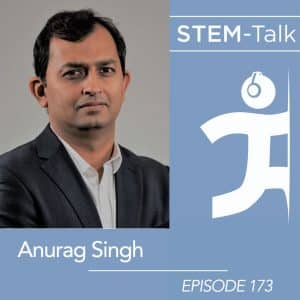STEM-Talk: Anurag Singh on aging, exercise, and urolithin-A
Published 9.23.24
Dr. Anurag Singh has spent his career using research to unlock a better treatment path for the chronic diseases that dominated his early medical practice.
“I felt I was blindly treating the symptomology of these chronic diseases (cancer, diabetes), and it gave rise to the question, ‘What if we could intervene earlier?’” Singh says.
The journey to answer that question led him to Nestle Health Science and ultimately to his role as chief medical officer at Timeline Nutrition, a Swiss life-science company focused on improving mitochondrial and cellular health. Singh, who has a medical degree in internal medicine and a Ph.D. in immunology, is our guest for the latest episode of STEM-Talk, available now wherever you listen to podcasts.
Singh is known for his research into the gut metabolite urolithin-A, which has been shown to improve muscle quality, protect immune systems, and optimize mitochondrial efficiency. This compound is produced by gut bacteria from metabolizing ellagitannins and ellagic acid, which are found in foods such as pomegranates, red and black berries, walnuts, pecans — and even Iberian ham.
In this conversation, Singh shares how his desire to put “hard biology” at the root of nutritional approaches to healthspan is having groundbreaking impact. He shares:
- His belief that “exercise is a miracle drug. As a physician if I could prescribe it to most of the aging population I would. The problem with exercise is compliance.”
- How his family’s high expectations shaped his childhood. His youth spent in post-colonial India was one in which education was highly valued. “There was always a very clear focus of what I needed to achieve,” Singh says. “Being a doctor was sort of the ultimate prize in education.”
- How his work with Nestle Health Science opened the door to his current research interests.
- How this interest in doing a deep dive into the cellular and biological impacts of the health benefits of certain foods evolved to focus on mitochondrial health.
- How Singh’s research on urolithin-A led to the development of Mitopure, the first postbiotic nutrient that has been shown to trigger mitophagy by targeting cellular decline.
- Urolithin-A’s possible role in improving joint health and disease progression in osteoarthritis, cardiac tissue, brain aging and cognitive decline, fatty liver disease, insulin resistance, and more.
- What he thinks of as the five pillars of healthy aging: Exercise, diet, advanced nutrition, sleep, and stress management.
IHMC is a not-for-profit research institute of the Florida University System where researchers pioneer science and technology aimed at leveraging and extending human capabilities. IHMC researchers and staff collaborate extensively with the government, industry and academia to help develop breakthrough technologies. IHMC research partners have included: DARPA, the National Science Foundation, NASA, Army, Navy, Air Force, National Institutes of Health, IBM, Microsoft, Honda, Boeing, Lockheed, and many others.
Latest News
- STEM-Talk: Pascal Lee on returning to the Moon — and heading to Mars
- Aging Symposium draws experts to IHMC
- IHMC hosts Fredric G. Levin Lung Care Symposium March 27-28 in Pensacola
- Humanoid robotics and exoskeletons lead latest IHMC newsletter
- Celebrate Robotics Week at IHMC Open House on April 11, 2025
- Registration open for 2025 Summer Robotics Camp
- STEM-Talk: JP Errico on vagus-nerve stimulation, inflammation and chronic disease management
- STEM-Talk: Karl Herrup on shortcomings of Alzheimer’s research
- Pensacola attorney joins IHMC Board of Directors


